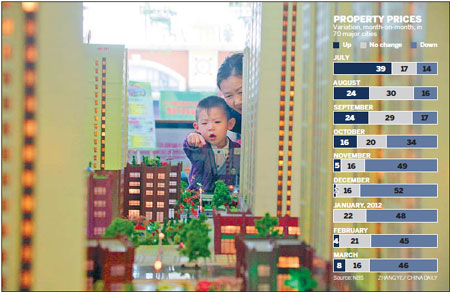New urban home prices slide in March
Updated: 2012-04-19 08:04
By Hu Yuanyuan (China Daily)
|
||||||||
|
A family visits a housing exhibition in Jilin, a city in Jilin province. Prices of new homes continued to fall in March amid government tightening measures. [Zhu Wanchang / for China Daily] |
Further declines likely as tightening measures continue in the country
New home prices in two-thirds of China's major cities fell in March, the National Bureau of Statistics said on Wednesday, and analysts said further declines were likely as the government's tightening measures continue.
Out of 70 major cities tracked by the government, 46 recorded falls, one more than in February, the NBS said in a statement.
Only eight cities registered price rises, while 16 were flat.
New home prices in Beijing and Shanghai each declined 0.8 percent year-on-year in March. On a monthly basis, Beijing saw a dip of 0.4 percent while Shanghai experienced a fall of 0.2 percent, the bureau said.
"We expect new home prices to continue to decline further as the government's tight real estate policies are set to continue, and the trend will persist at least through the first half of 2012," said Qin Xiaomei, chief researcher at Jones Lang LaSalle.
The State Council said on Friday that the government would "maintain property control policies without wavering", even after economic growth slowed to a near three-year-low of 8.1 percent in the first quarter of 2012.
Andy Zhang, managing director of Cushman & Wakefield China, said there is still ample room for home prices to drop in the coming months.
"The recent rebound in property transactions is unsustainable as investment-oriented purchases are still under strict control," said Zhang.
China has been curbing the sector for more than one year, including restricting the number of homes a family could purchase, hiking minimum down payments and introducing property taxes in select cities. All those measures targeted investment buyers.
Expectations for further declines in prices are also discouraging some prospective buyers.
Xiao Wei, a 30-year-old company executive, had planned to buy a home outside the capital's eastern Fifth Ring Road. However, after prices at the project were cut 10 percent in March, he changed his mind.
"Maybe the price could fall even further in the coming months, so I'll postpone my purchase plan," Xiao said.
Meanwhile, as tightening measures persist, more small developers may go bankrupt, and there will be more mergers and acquisitions, creating more investment opportunities for domestic and foreign institutions, analysts said.
According to Fitch Ratings Ltd, the recent bankruptcy filing by Hangzhou Glory Real Estate Co, a comparatively small homebuilder that focused on the high-end market in Hangzhou, shows how regulations continue to polarize the Chinese property market between large and small players.
Lower property prices and sales volumes are hurting profit margins and cash flow.
"This means that the homebuilding sector remains highly challenging for the smaller local and regional operators such as Hangzhou Glory, which have neither the scale nor liquidity to ride out the slowdown," Fitch said in a recent research note.
Wang Qiong, head of research at Savills (Beijing), a UK-based real estate consultancy, said a number of international real estate funds are contacting Savills about investment opportunities in China.
"It seems that the better-than-expected performance of the US economy has made the fundraising situation for real estate funds easier," Wang said.
For Jack Ye, national director of investment and capital markets of Cushman & Wakefield China, controls on housing are making office and retail properties appealing for investment.
"We expect to see more offshore funds investing in real estate projects, and also an increase in land transactions in second- and third-tier cities," said Ye.
"Offices in Beijing and Shanghai remain a hot spot for investment, while retail markets in first- and key second-tier cities are also a focus for institutional investors," he added.
huyuanyuan@chinadaily.com.cn

 Relief reaches isolated village
Relief reaches isolated village
 Rainfall poses new threats to quake-hit region
Rainfall poses new threats to quake-hit region
 Funerals begin for Boston bombing victims
Funerals begin for Boston bombing victims
 Quake takeaway from China's Air Force
Quake takeaway from China's Air Force
 Obama celebrates young inventors at science fair
Obama celebrates young inventors at science fair
 Earth Day marked around the world
Earth Day marked around the world
 Volunteer team helping students find sense of normalcy
Volunteer team helping students find sense of normalcy
 Ethnic groups quick to join rescue efforts
Ethnic groups quick to join rescue efforts
Most Viewed
Editor's Picks

|

|

|

|

|

|
Today's Top News
Health new priority for quake zone
Xi meets US top military officer
Japan's boats driven out of Diaoyu
China mulls online shopping legislation
Bird flu death toll rises to 22
Putin appoints new ambassador to China
Japanese ships blocked from Diaoyu Islands
Inspired by Guan, more Chinese pick up golf
US Weekly

|

|







